Physiotherapy
The Physiotherapy Department provides service to the following specialities:
Inpatients
- Cardiology and Cardiothoracics
- Emergency Medicine
- General Medical
- General Surgical
- Geriatric Evaluation and Management (GEM)
- Intensive Care and High Dependency
- Liver and Renal Transplant (State Specialist Centre)
- Medical Assessment Unit
- Neurology and Neurosurgery
- Oncology
- Orthopaedics
- Plastics
-
Respiratory Medicine and Cystic Fibrosis
Outpatients
- Advance Practice Roles: Comprehensive Spinal Clinic, Orthopaedics and Rheumatology
- Breast Centre
- Cardiac Rehabilitation
- Cystic Fibrosis and Bronchiectasis
- Day Hospital
- Hydrotherapy
- Liver Transplant
- Lower Limb Lymphoedema Service
- Musculoskeletal
- Pain Management
- Plastics
- Pulmonary Rehabilitation
- Vestibular and Neurological Rehabilitation
- Women’s and Men’s Health
Students
We are proud of our role as a teaching and research hospital and supporting the next generation of health care professionals. We have a range of physiotherapy students undertaking clinical placements at SCGH to gain essential clinical experience which will hopefully provide the foundations for their future career in the health care environment. In 2019-20 we employed two new graduate physiotherapists.
We support the Physiotherapy programs at Curtin University and the University of Notre Dame Australia. Each year we provide practical experience to over 300 physiotherapy students. We also support post-graduate students in the specialised Cancer service, Outpatient Musculoskeletal and Allied Health assistants in the GEM unit.
The clinical calendar is divided into 10 consecutive five week blocks of full time day shifts. All students (University of Notre Dame and Curtin University) commence each placement on the Tuesday of the first week and finish on the Thursday of the final week.
Curtin Physiotherapy Clinic
Located in the Physiotherapy Outpatients Department in A Block, the clinic is run by a full-time supervisor and six final year physiotherapy students from Curtin University. The same public referral guidelines for the Outpatient Physiotherapy Department apply to the Curtin Physiotherapy Clinic (external site).
Research
Many members of the Physiotherapy Department are involved with postgraduate research, either undertaking a Masters or PhD, or in a supervisory role. Below is a list of the achievements of our research clinicians.
Doctors of Philosophy and Research Staff
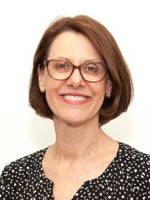 |
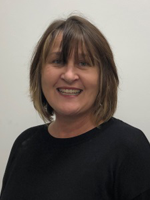 |
|
Nola Cecins BAppSci (PT), MSc, OAM Master’s Thesis: Airway clearance techniques in bronchiectasis: evaluation of the head-down position. Special interests: pulmonary rehabilitation, exercise training and testing in people with chronic lung disease. |
Diane Dennis, BAppSc(PT), GradDip (Health Administration), PhD PhD Thesis: Exploring different models of stroke unit care and outcome: The Stroke Rehabilitation Outcome (SRO) study. Special interests: neuroscience, bariatric medicine and critical care. |
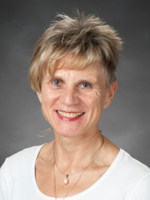 |
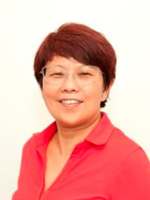 |
|
Brigitte Tampin, GradDipManipTher, MSc, PhD PhD Thesis: Clinical and somatosensory characteristics of patients with nerve-related neck-arm pain. Special interests: neuromuscular disorders and neuropathic pain, advanced scope physiotherapy. |
Linda Khong, M ManipTher, B App Sc. (Physio Hons), B Business Admin, PhD PhD Thesis: Providing peer-led falls prevention education for older people. Special interests: lymphoedema, plastics, falls prevention. |
Masters
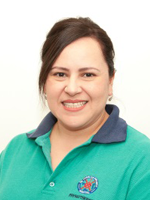 |
|
|
Mena Garcia-Vega
Master’s Thesis: A Pilot investigation of the safety and feasibility of the application of cathodal transcranial direct current stimulation to the contralesional primary motor cortex plus standard upper limb rehabilitation post-acute stroke.
Special interests: acute stroke, traumatic brain injury, brain tumours, spinal pathology, early rehabilitation and adjuvant technologies to enhance neuroplasticity and maximise recovery after acquired brain injury. |
|
Doctor of Philosophy (PhD) Students
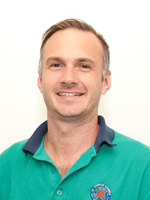 |
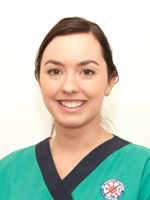 |
|
Jamie Wood PhD Thesis: Impact of integration of telehealth with usual care in cystic fibrosis (ongoing). Special interests: cystic fibrosis, respiratory disease, airway clearance, telehealth. |
Abbey Sawyer PhD Thesis: Effects of high intensity interval training in cystic fibrosis (ongoing). Special interests: cystic fibrosis, respiratory disease, exercise testing and prescription. |
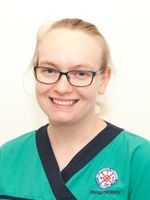 |
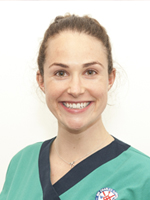 |
|
Naomi Chapman PhD Thesis: The Metaneb® System in adults with cystic fibrosis: investigating its effects during periods of clinical stability and disease exacerbation (ongoing). Special interests: cystic fibrosis, respiratory disease, airway clearance, neurology, rehabilitation post neurological event. |
Nichola Foster PhD Thesis: Traumatic Heterotopic Ossification: Exploring Prevalence, Risk Factors, Prevention and Treatment (ongoing). Special interests: traumatic heterotopic ossification, impact of heterotopic ossification on rehabilitation post burns, neurological and orthopaedic trauma, neurological rehabilitation. |
Staff Publications
Education and Professional Development
Education
Undergraduate Education
Clinical education is an integral part of physiotherapy education in Australia. As part of their accreditation requirements, all Australian physiotherapy courses include mandatory supervised practice in the clinical environment. Sir Charles Gairdner Hospital provides over 300 placements each year to Physiotherapy students enrolled at the University of Notre Dame Australia and Curtin University. Student interactions with patients are supervised by qualified practitioners who guide the development of essential skills in a peer-supported environment. This allows the students to consolidate theory into practice and develop clinical and professional expertise.
Collaborative Learning Models
Collaborative Learning Models are used in most clinical areas at SCGH. This allows one physiotherapist to supervise two or more students. This type of student-model is commonly used in Australian physiotherapy practice.
Examples are:
- 6:1 Model: Curtin Musculoskeletal Physiotherapy Clinic
- 4:1 Models: Intensive Care, Respiratory Medicine, General Surgery, Neurology (inpatients and outpatients)
- 2:1 Models: Cardiothoracic Surgery, Neurosurgery, Oncology, General Medicine, Aged Care
For more information please contact: Tracy.Hebden-Todd@health.wa.gov.au
Work Experience
Where feasible, work experience may be offered to physiotherapists requiring refresher training in order to re-enter the workforce.
For more information please contact the A/Head of Department:
Tracy.Hebden-Todd@health.wa.gov.au
Professional Development
External Professional Development
The Physiotherapy Department is committed to providing learning opportunities for physiotherapists outside of the tertiary setting. We will often tailor these to meet the needs of the individual/service.
Examples are:
- Specialist training workshops
- Conducted for physiotherapists within WA, national and international participants on and offsite
- Topics include: Pulmonary Rehabilitation, ICU, airway clearance, basic respiratory skills, plastering skills and neuro-rehabilitation
- Teaching in the Tertiary setting
- Teleconferencing for Neurology, Respiratory and Intensive Care Unit advice
- Bariatric patient management
- Work shadowing and observational learning
SCGH Courses
If you are interested in any of these options please contact:
Bariatric: Vicki.Carter2@health.wa.gov.au
Intensive Care: Lisa.Marsh@health.wa.gov.au and Tracy.Hebden-Todd@health.wa.gov.au
Neurology: Leanne.Cormack@helath.wa.gov.au and Tracy.Beckwith@health.wa.gov.au
Plastering: Julie.Beard@health.wa.gov.au and Julie.Lewis@health.wa.gov.au
Pulmonary Rehab: Nola.Cecins@health.wa.gov.au
Respiratory: Jamie.Wood@health.wa.gov.au

